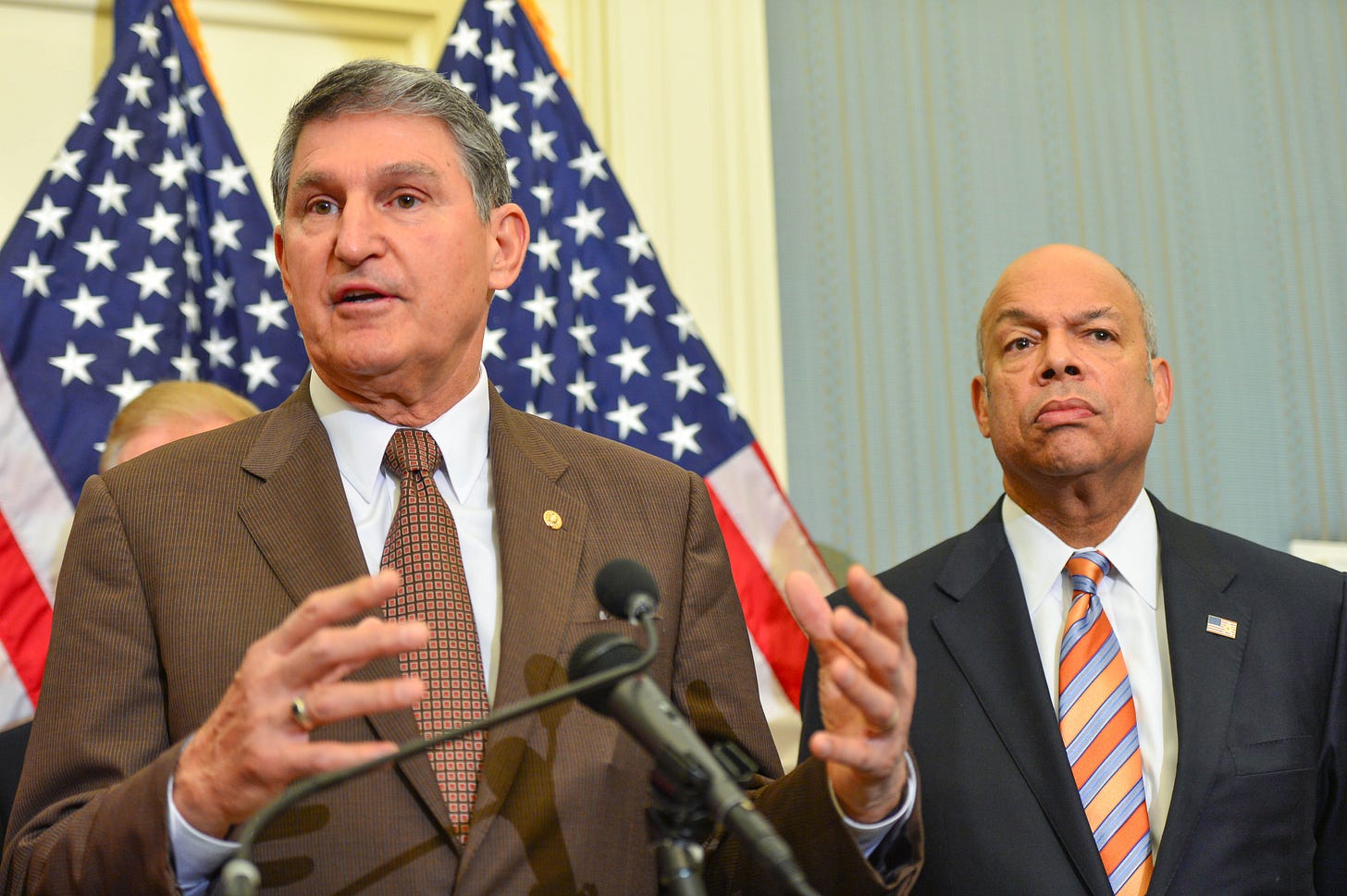The Liftoff: Oregonian of the Year
Plus: Seismic shift coming in the legislature; Kristof residency under a microscope; Madras man escapes Haitian kidnappers; Rep. Ron Noble joins the podcast; Intel struggles to get it right on China.
Happy holidays from your friends at Oregon 360!
This is our final installment of The Liftoff of 2021! Below you’ll see some news stories of this past week—but you’ll also see our choices for Oregonians of the Year (one Democrat, one Republican, one nonpartisan).
We at Oregon360 have a lot to be grateful for in 2021. At the top of that list is you: a growing community of Oregonians who care about Oregon’s civic culture. Through our podcast, op-eds, and newsletter, more and more folks are hearing from people they normally wouldn’t. And we think that’s a good thing.
Here’s to a better 2022!
P.S. We hit some big milestones this year: Our podcast episodes were downloaded/watched over 10,500 times! We are also just a couple paid subscribers away from our goal. Will you become a paid member before the New Year? It’s only $10/month!
1. Oregon 360’s Oregonians of the Year
We admit it: this is a very subjective title. These three selections for our inaugural “Oregonians of the Year” were made by the cross-partisan team at Oregon360 based on who we believe had the biggest impact and largest degree of influence on Oregon, and Oregon politics in particular, in 2021. These selections aren’t endorsements. Do you have a different take? Let us know!
Democrat: Speaker Tina Kotek
Whether she ultimately becomes Governor or not, House Speaker Tina Kotek is undoubtedly one of the most powerful and influential state legislators in modern Oregon history. She’s the longest serving Oregon Speaker ever—and her fingerprints are on nearly every single piece of major legislation that’s been passed over the last decade, from the historic Student Success Act, to climate legislation, to a trend-setting bill on housing policy, to an expansion of reproductive rights, to, of course, the legislative and congressional districts that will remain for a decade. Republicans have demonized her and accused her of dishonesty; progressives have vigorously defended her and laud her ability to wield power and get results. And, for the first time in her career, she will be on a statewide ballot in 2022—and voters will decide whether to give the person that Willamette Week described as “perhaps the most powerful leader in the state, even without the title of governor” a chance to hold the title, power, and responsibility of being Oregon’s top elected leader.
Republican: Rep. Christine Drazan
We’ve said it before and we’ll say it again: as leader of the House GOP Caucus, Rep. Christine Drazan helped her caucus punch above its weight class. She held her caucus together—one with both old-school moderate Republicans and hardcore Trump affiliates—with uncommon discipline. After being elected minority leader in her first year in the legislature (by itself a remarkable achievement), she kept her caucus unified in condemning both disgraced former Rep. Mike Nearman and the conspiracy-laden State GOP platform (even more remarkable achievements). Last session, by using every tool available to her, Drazan gummed up the legislative process and forced a major concession from Democrats: equal seats on the House Redistricting Committee, as long as she stopped holding things up. Political observers (and participants) were split on whether that was a stroke of genius or a serious miscalculation. In the end, she didn’t get the equal number of seats. However, there is little doubt that Oregon’s congressional districts are more competitive than they would have been without Drazan’s maneuvering. One thing Drazan has not been able to do: meaningful influence most major legislation in the minority. Now, Drazan has entered the most competitive field for Oregon governor in recent memory to try and change that.
Nonpartisan: Tim Boyle
Columbia Sportswear CEO Tim Boyle has had a big year. He visited with President Joe Biden at the White House in support of a federal vaccine mandate (and Biden complimented Columbia’s gear, saying he wore some on a trip to Louisiana). He also joined the University of Oregon Board of Trustees. He donated millions to charitable causes and higher education institutions. He stuck his neck out on controversial topics on several occasions, including defending the display of a President Teddy Roosevelt statue and publicly (and financially) supporting People for Portland. Most recently, after a history of supporting both Republican and Democratic candidates, he’s given his largest Oregon political contribution ever to former senator Betsy Johnson, an non-affiliated candidate for Governor. As of today, Forbes estimates that Boyle is worth a staggering $2.5 billion—and they named Columbia “America’s Most Trusted Brand”, highlighting their significant employee benefits, outreach to consumers of color, sustainability initiatives, and “approachable” personality. After a high-profile year as Oregon’s most prominent business owner, Boyle is reaching his stride as public leader, too: we expect 2022 will be an even bigger year for him.
2. Governor’s race news
Speaker Kotek locked in another key endorsement in the Democratic primary for governor: the Oregon Nurses Association. Why does this endorsement matter? 1) ONA is likely to provide significant resources to Kotek’s campaign. 2) This continues a nearly clean sweep of progressive organizational endorsements for Kotek.
Oregon Secretary of State Shemia Fagan’s office is asking Nick Kristof for more proof that he meets Oregon’s residency requirements for running for Governor. Kristof’s case was bolstered by three former Oregon Secretaries of State (Phil Keisling, Bill Bradbury, and Jeanne Atkins—all Democrats) in an Oregonian op-ed that basically says a candidate’s view of their residency should be given the most weight, and the rest should be left up to voters.
It looks like Betsy Johnson has found her campaign consultants: she listed a $25,000 expenditure to Gallatin Public Affairs and a $50,000 check to Wheelhouse Northwest for “management services.” Gallatin’s president is Dan Lavey, who has a deep history in GOP politics in Oregon, and Wheelhouse’s is Kevin Looper, who has a deep history in Democratic politics. Both have been in the news for helping to found People for Portland.
3. Brace yourself for a seismic shift in the legislature
Thanks to our friend Carl Fisher for compiling this preliminary list of upcoming changes to the legislature. One thing is for sure: this is just the beginning. 1) More announcements will be made next year, 2) there is usually a filing day surprise (or two), and 3) some incumbents will likely lose.
The 2023 legislative session will see an unusually high percentage of new faces. Here’s the current list (not including the rumors we’ve heard for about a half a dozen additional legislators) of folks who will not be back in there current roles (Rep. Sheri Schouten is the latest to make an announcement):
Resigned/Will Resign
Senator Burdick
Representative Post
Representative Clem
Senator Johnson
Senator Riley
Will Not Run Again
Representative Reardon
Representative Witt
Representative Schouten
Representative Zika
Representative Hoy
Senator Beyer
Senator Thomsen
Running for Higher Office
Speaker Kotek (Governor)
Representative Drazan (Governor)
Representative Noble (Congress)
Representative Salinas (Congress)
Senator Lawrence Spence (Portland City Commission)
Representative Hayden (Senate)
Representative Campos (Senate)
Representative Bonham (Senate)
Representative Sollman (Senate)
Representative Moore-Greene (Senate)
Representative Weber (Senate)
Representative Meek (Senate)
4. Federal Wrap-up: Intel in hot water over Xinjiang statement; Oregon missionary escapes kidnappers in Haiti; Salinas gets dinged by Politico; Wyden thinks BBB is still happening
This section was authored by Alex Titus, co-host of The Oregon Bridge podcast.
Intel is in hot water at home and in China after a recent letter it sent to suppliers asking them not source goods from China’s Xinjiang region. Here’s the breakdown:
Xinjiang, a region in northwest China, is home to the Uyghurs, a mostly Muslim minority group that has been subjected to genocide, forced labor, and torture by the Chinese government.
The region is also a production powerhouse and hosts a number of major suppliers to American and European firms.
Intel, which sent the letter to comply with US sanctions, received intense backlash on Chinese social media which caused the company to walk back the statement noting that it respected the “sensitivity” of the issue in China.
The company’s walk-back enraged journalists, activists, and politicians in the US who argue that that Intel is “denying reality” and succumbing to pressure from the Chinese government.
The walk-back also came out around the same time the U.S. Senate passed a bipartisan bill banning goods from Xinjiang over forced labor.
Flashback: Intel has faced severe criticism in the past for supporting the Chinese Communist Party’s surveillance state.


Crazy story of the week: Austin Smucker, a Madras native, is home after pulling off a wild escape (made for a movie) from his kidnappers in Haiti. Austin and fellow missionaries have been in the national headlines for months after their church group was kidnapped and held for months in the impoverished Caribbean nation. Here are the details:
Missionaries from the Ohio-based Christian Aid Ministries were kidnapped on October 16 by the notorious 400 Mawozo gang. 17 missionaries were kidnapped by the gang, including children and a baby.
Christian Aid Ministries tried to negotiate with the gang but negotiations quickly broke down after they demanded a $17 million ransom payment.
Smucker and other missionaries attempted a daring escape after two months in by breaking open a loose door and hiking nearly 10 miles in brush guided by moonlight
Despite losing a few pounds, Smucker’s mom told The O in a statement that he’s “physically well.”
Zane Sparling over at the Oregonian has you covered with the full story.
Rep. Andrea Salinas, who is running for the new 6th Congressional District and chaired the House Redistricting Committee, was put in the spotlight last week by Politico reporter Ally Mutnick, who took direct aim at Salinas in a piece titled “You can draw your own congressional district.” Here’s the (tough) opening graph:
“Andrea Salinas helped Oregon Democrats muscle through a favorable new congressional map this fall as the chair of her state House's redistricting committee.
Then, just weeks later, she declared a run for one of the new seats she helped create — a maneuver that did not go unnoticed.”
Salinas’ Campaign Manager Campaign Manager responded to the piece by noting that “Andrea firmly believes that legislative seats don’t belong to legislators, but to their constituents.” Former Multnomah County Commissioner Loretta Smith, who is running against Salinas, was also quoted in the piece suggesting that Salinas may have skewed the process in her favor. It’s worth noting that neither Smith nor Salinas lived in the new district when the lines were drawn.
Finally, in some potentially good news for President Joe Biden, Senator Ron Wyden believes that Senator Joe Manchin may be able to come on board to support some of the key measures of Biden’s Build Back Better agenda.
5. Rep. Ron Noble joins the Bridge and talks policy, policing, and his run for Congress
Rep. Ron Noble spent his career in law enforcement before he entered the political fray as a state representative in House District 24 (Yamhill County). Bolstered by a reputation as a reasonable, moderate legislator, he is now running for the new, ultra-competitive 6th Congressional District, stretching from eastern Washington County all the way down to Salem, including Yamhill County.
Noble earned headlines for leading, along with Rep. Janelle Bynum, on a suite of 25 bills that helped reform policing and the criminal justice system. In this episode, we talk about how Noble has built the relationships necessary to pass bipartisan bills through the deep-blue state legislature, his views on COVID, racial justice issues, health care policy, and why he's running for Congress.
6. News Round-up
Be like BOTH Joe Biden and Donald Trump: get your booster! Start here:
What it means to be ‘vaccinated’ might be changing: “University of Oregon requires COVID-19 booster for students, faculty”
Oregon man sets off national media firestorm by saying “Let’s go Brandon” to President Biden on Christmas Eve.
Gov. Kate Brown extends emergency declaration with Omicron spreading rapidly; she added an emergency declaration for severe winter weather (joining Portland and Multnomah County)
Weirdest story of the week: Mike Cully, leader of the League of Oregon Cities, was forced to resign amid inappropriate Twitter behavior directed at the Mayor of Beaverton
Oregon might be receiving major money from a multi-billion dollar opioid settlement.
Oregon might have a handful of competing campaign finance reform measures on the ballot at the same time, according to OPB
Burn, baby, burn? A climate critique of ODOT and its defense
Stay safe and warm: “Thousands without power as winter weather impacts Oregon”
Thank you for reading.
Tips? Feedback? Ideas? Corrections? We want to hear from you! Email benjaminwbowman@gmail.com.
If you value this newsletter, please become a paying subscriber today. Your support will help us grow and offer more opportunities to this community. It’s just $10 a month!
Interested in advertising with us? Get in touch!












Very interesting on several fronts. I just wish Oregon had an honest Senator like Joe Manchin who is truthful about our national debt and the dishonest budget gimmicks always pushed by our own Senators.